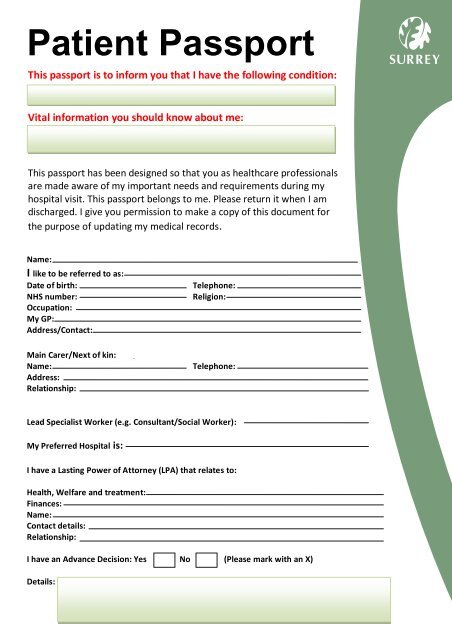Patient Passport
Patient-Passport-January
Patient-Passport-January
Create successful ePaper yourself
Turn your PDF publications into a flip-book with our unique Google optimized e-Paper software.
<strong>Patient</strong> <strong>Passport</strong><br />
This passport is to inform you that I have the following condition:<br />
Vital information you should know about me:<br />
This passport has been designed so that you as healthcare professionals<br />
are made aware of my important needs and requirements during my<br />
hospital visit. This passport belongs to me. Please return it when I am<br />
discharged. I give you permission to make a copy of this document for<br />
the purpose of updating my medical records.<br />
Name:<br />
I like to be referred to as:<br />
Date of birth:<br />
NHS number:<br />
Occupation:<br />
My GP:<br />
Address/Contact:<br />
Main Carer/Next of kin:<br />
Name:<br />
Address:<br />
Relationship:<br />
Telephone:<br />
Religion:<br />
Telephone:<br />
Lead Specialist Worker (e.g. Consultant/Social Worker):<br />
My Preferred Hospital is:<br />
I have a Lasting Power of Attorney (LPA) that relates to:<br />
Health, Welfare and treatment:<br />
Finances:<br />
Name:<br />
Contact details:<br />
Relationship:<br />
I have an Advance Decision: Yes No (Please mark with an X)<br />
Details:
Aids and equipment used:<br />
Mobility needs:<br />
How I communicate:<br />
How and when I take my medication:<br />
Personal care needs:<br />
Dietary preferences:<br />
Night time needs:<br />
Allergies:<br />
Additional information:<br />
Consent for information about me to be shared with Health and Social Care professionals.<br />
Agree Disagree (Please mark with an X)<br />
Signed:<br />
Date:
PATIENT PASSPORT<br />
GUIDANCE NOTES FOR COMPLETION<br />
This passport has been designed so that the healthcare professionals are made aware of patients’ needs and<br />
requirements caused by long term neurological condition so they can provide you with the best possible<br />
healthcare whenever you visit hospital.<br />
When you have completed and printed out your passport, take it with you whenever you visit hospital and<br />
show it to the doctors, nurses and any other healthcare professionals you come into contact with. If you are<br />
admitted to hospital, ask the nurses to keep your passport with your notes at the bottom of your bed.<br />
The passport is not expected to hold all the available information about the person, however please<br />
complete it as fully as possible. It should however contain the detail to enable staff within i n f o r m a t i o n<br />
a n d health services to understand your everyday needs. The <strong>Patient</strong> <strong>Passport</strong> makes a connection with<br />
those who know you least (staff in hospitals) with those people who know you best (carers/ parents /care<br />
co -coordinators /specialist nurses/ community nurses/therapists etc.)<br />
The <strong>Patient</strong> <strong>Passport</strong> is intended to help the staff from health care services to be able to offer you the right<br />
help at the point of contact with the services and provide the necessary care and treatment needed during<br />
the person’s stay in hospital.<br />
DEFINITIONS<br />
1. Consent; This is recognised to be an area of concern within practice. The Mental Capacity Act (2005)<br />
provides a statutory framework to empower and protect vulnerable people who are not able to make their<br />
own decisions. It makes it clear who can take decisions, in which situations, and how they should go about<br />
this. It enables people to plan ahead for a time when they may lose capacity.<br />
2. Advance Decision; An advance decision (sometimes known as an advance decision to refuse treatment, an<br />
ADRT, or a living will) is a decision you can make now to refuse a specific type of treatment at some time in<br />
the future.<br />
It lets your family, carers and health professionals know whether you want to refuse specific treatments in<br />
the future. This means they will know your wishes if you are unable to make or communicate those decision<br />
yourself. Advanced decisions can only be used to refuse specific treatments and cannot be used to demand<br />
future care.<br />
The treatments you are deciding to refuse must all be named in the advance decision.<br />
You may want to refuse a treatment in some situations, but not others. If this is the case, you need to be<br />
clear about all the circumstances in which you want to refuse this treatment.<br />
You can refuse a treatment that could potentially keep you alive (known as life-sustaining treatment). This<br />
includes treatments such as ventilation and cardio pulmonary resuscitation (CPR), which may be used if you<br />
cannot breathe by yourself or if your heart stops. You may want to discuss this with a doctor or nurse who<br />
knows about your medical history before you make up your mind.<br />
An advance decision is not the same as an advance statement. Read about advance statements.<br />
Deciding to refuse a treatment is not the same as asking someone to end your life or to help you end your<br />
life. Euthanasia and assisted suicide are illegal under English law.
3. Lasting Power of Attorney; A lasting power of attorney (LPA) is a way of giving someone<br />
you trust the legal authority to make decisions on your behalf if you lack mental capacity<br />
at some time in the future or no longer wish to make decisions for yourself.<br />
There are two types of LPA:<br />
1. Property and financial affairs<br />
2. Personal welfare.<br />
1. Property and financial affairs<br />
This can be used while someone still has mental capacity. An attorney (the person who makes<br />
decisions for you) can generally make decisions on things such as:<br />
<br />
<br />
<br />
<br />
<br />
Buying and selling property<br />
paying the mortgage<br />
investing money<br />
paying bills<br />
arranging repairs to property.<br />
2. Personal welfare<br />
This covers decisions about healthcare as well as personal welfare and can only be used once a<br />
person has lost mental capacity. An attorney can generally make decisions about things such as:<br />
<br />
<br />
<br />
<br />
<br />
Where you should live<br />
Your medical care<br />
What you should eat<br />
Who you should have contact with<br />
What kind of social activities you should take part in.<br />
You can restrict or specify the types of decisions your attorney can make or you can allow them<br />
to make all decisions on your behalf.<br />
You may be asked to provide evidence of a Personal Welfare Lasting Power of Attorney on<br />
admission to hospital by the staff.<br />
If you’re setting up a property and financial affairs LPA, your attorney<br />
must keep accounts and make sure their money is kept separate from<br />
your money.<br />
You can request a regular detail of how much is spent and how<br />
much income you have. This offers you an extra layer of<br />
protection. If you lose mental capacity, these details can be sent<br />
to your solicitor or a family member.<br />
Page 4



